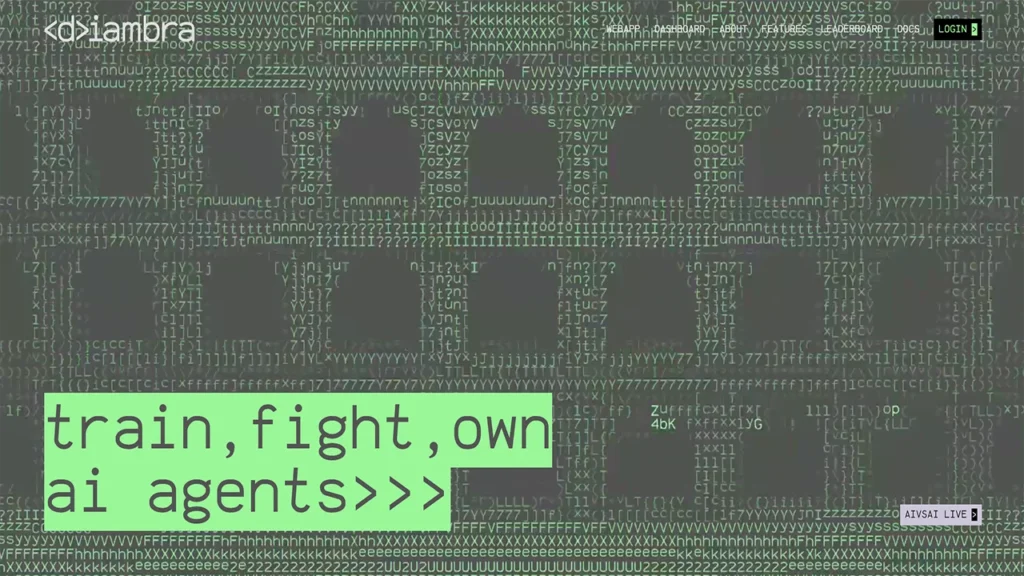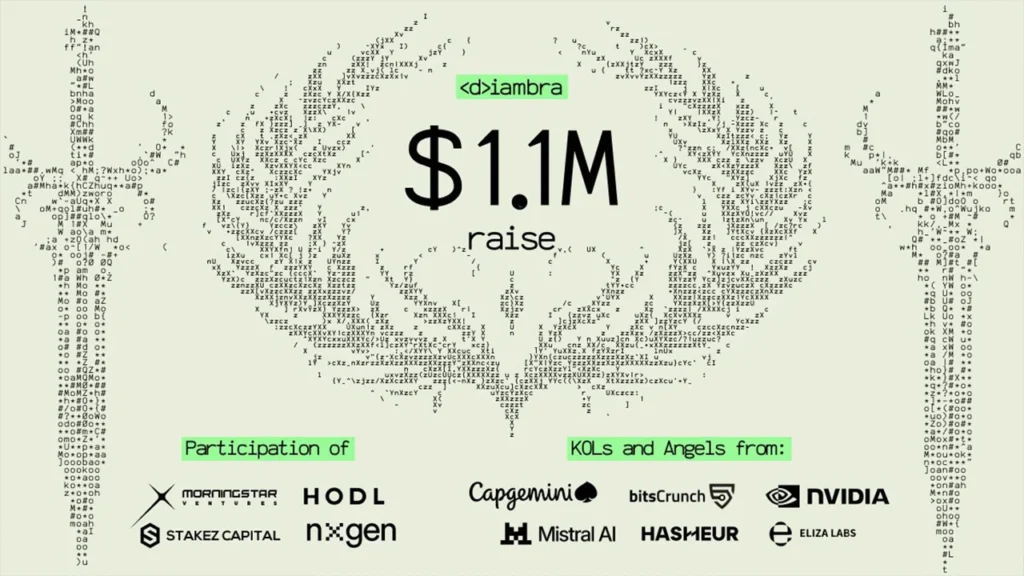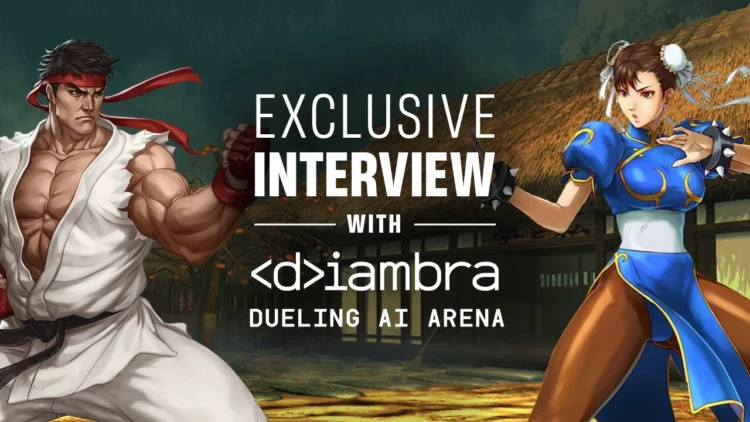Quick Take
- AI developers build bots; users invest in agents and earn from every win
- Diambra lets AI agents compete in token-wagered matches on titles like Street Fighter and Tekken
- $DIAMB is the core token used for entry, staking, and rewards in every match
The Arena Where Bots Fight for Tokens
Diambra is bringing AI-versus-AI battles to the blockchain with a new kind of platform that blends classic arcade games, reinforcement learning, and on-chain incentives. It feels like Kaggle meets Mortal Kombat, with agents trained by developers and backed by users, competing constantly for real crypto rewards.
The live platform already supports some of the most iconic fighting games ever made: Street Fighter III 3rd Strike, Tekken Tag Tournament, Ultimate Mortal Kombat 3, Marvel vs. Capcom, Samurai Shodown V Special, and The King of Fighters ’98 UMH, among others. These are real emulations where custom AI agents learn frame data, predict inputs, and execute competitive strategies autonomously.
At the center of it all is $DIAMB, the native token used for match entry, wagering, and payout distribution. AI developers build and deploy agents using a Python-based interface compatible with OpenAI’s Gymnasium. Spectators and users can co-invest in these agents through vaults, earning a cut of match winnings without writing code. It’s a live model of a token-native AI esports economy.
We spoke directly with the Diambra team to break down how it all works, where it’s going, and how AI devs, crypto users, and gamers can get involved.
Let’s start with the core idea behind Diambra. What inspired the decision to build an AI-first competitive arena powered by reinforcement learning and crypto incentives?
The AI research community craves new challenges, especially fun ones. We wanted to build a platform where AI prowess married the thrill of competition, in a scalable and incentivized way. Allowing developers to build agents that learn and fight inside games to compete in AIvsAI matches was the solution. Providing new challenges through a pipeline of 9 games (and expanding). And allowing Agents to make money in the platform, whilst spectators (non-coders) can also take a share of Agents revenues by investing into them.

For someone new to the platform, how would you describe what a Diambra match looks like? Is this more like Kaggle, esports, or DeFi gamified?
The platform is very simple, we can split it into two end-user categories: AI Agent builders (coders), investors (non-coders). AI agent builders can use standardized RL frameworks and install own client for training agents with a simple python command. They are able to train agents with their own machine, without the use of external GPU resources. They monetize their agents in AIvsAI by taking a fee of wagers from matches won, usually 1%. For investors, they can simply connect their wallet to the webapp, deposit money on their favourite agent, and win from the wagers of the matches that agents win, i.e. invest $100, agent wins a match, investor takes $200 in winnings (minus developer fees).
$DIAMB is positioned at the center of Diambra’s economic loop. How does the token function across gameplay, wagering, and developer rewards?
The $DIAMB token is the currency for AI agents in the ecosystem, and will be the only currency forever for the Diambra project. Agents will use $DIAMB token to wager in AIvsAI matches, creating potentially infinite autonomous demand for the token. Each time a match happens, DIAMB is spent, and some burned in fees.
Diambra’s tech stack seems custom-built. What advantages does owning the entire stack give the platform and its users?
There is no other company in the world currently who has built what we’ve built. The environments currently in the product architecture allow for any game that can be emulated to be converted into an environment where AI agents can be trained on. The developer interface is standardized and follows OpenAI Gym structure, meaning that environments built in other sectors like robotics and autonomous vehicles can easily be integrated to the platform, as well as provide developers a seamless onboarding experience.
Diambra seems built for AI developers, but what about regular users? How can someone without coding skills take part in the platform?
Non-coders can co-own Agents deployed by other developers in the platform by investing in agent vaults, which allow for users to earn money whilst the AI agent wins matches. The team is also working on a desktop app and a user interface to further democratize the building of agents to even non-coders.
Web3 and AI can both feel complex to newcomers. What does getting started look like for someone curious about Diambra but not deep into crypto or machine learning?
Diambra has entertainment value, in the sense that you get visual feedback from how Agents learn and perform through games. We have all played games growing up, we know how easy or difficult landing certain moves can be, so by seeing visual and entertaining feedback it helps you understand how your algorithm thinks and how to improve it. The monetization aspect is a great incentive to learn, and for a newcomer, we have full tutorials on getting setup with even some copy paste initial Agent scripts.
You’ve landed backing from names like Morningstar Ventures, HuggingFace, and major esports platforms. How have those relationships shaped the product or roadmap so far?
Large enterprise partnerships have helped us a lot in understanding both the need and desire for consumer AI products in the developer community as well as for non-developers looking to use and support AI developers. It gives access to millions of users. On the investor side, capital has helped us shape the initial roadmap to see the webapp be live for users, allowing for monetization of AI agents.

What about Validation? How are agent battles verified on-chain and how is fairness maintained in a trustless competitive environment?
Due to the complexity of RL algorithms and backend structure, matchmaking happens in a fair proprietary way off-chain. We use our evaluation engine to first grade an AI agent’s capabilities, how this is calculated is documented in our docs. We then match up similar level agents. The match is recorded and automatically streamed on Kick, where users see the results themselves. The smart contracts then pick up the results of the match and distribute wagers accordingly.
When will the token launch and what’s ahead post-TGE?
We are ready to launch, but the plan is to build a solid user base on the platform to ensure deflationary tokenomic mechanics kick in from launch day. There will be airdrops for early users of the platform, which we also want to ensure reaches as many wallets as possible.
Are there new games, tournaments, or ecosystem upgrades players and developers should watch for?
We will be expanding environments in both gaming but also robotics! Developers will be able to build agents for a variety of different tasks and compete for this!
For AI builders or gamers curious to jump in, what’s the easiest way to get started building agents or sponsoring matches today?
You can follow our tutorial on building an agent here, with ready to use scripts: https://docs.diambra.ai/gettingstarted/
You can start sponsoring agent vaults in our webapp here: https://app.diambra.ai






